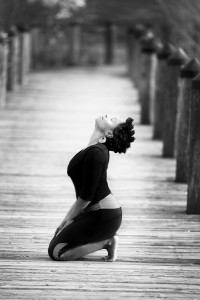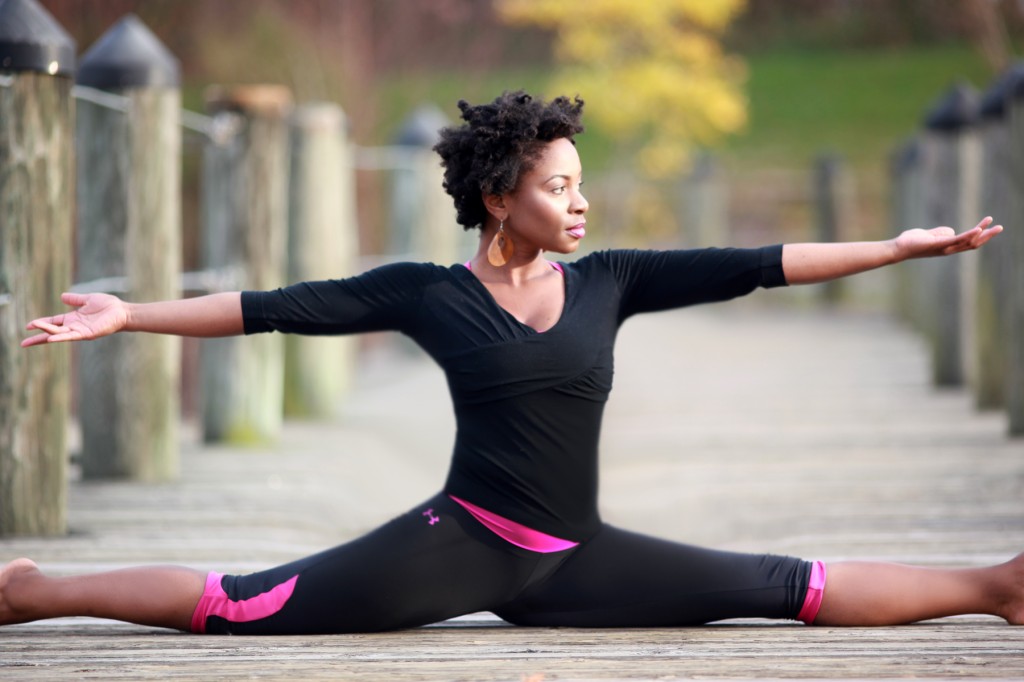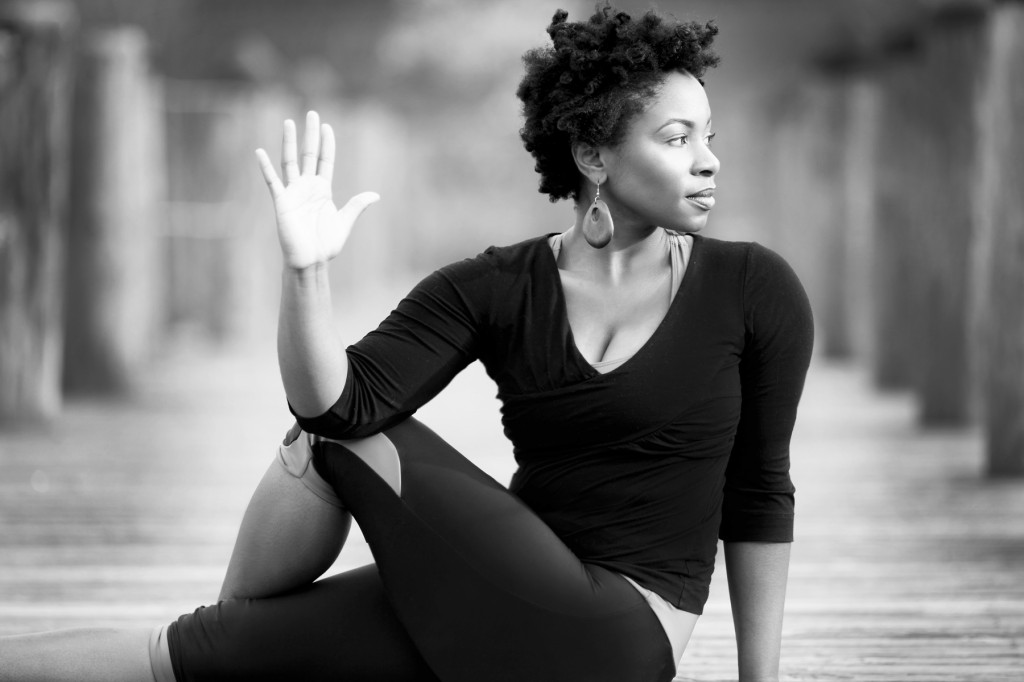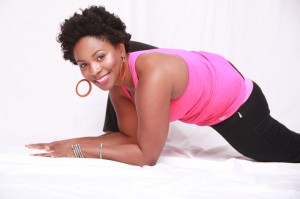Sisters of the “Yogic” Yam: bell hooks and the Yoga in Self-Recovery
By Sariane Leigh
 A 20-something skinny blond leading a yoga class gazed at me with a condescending smirk. I am doing my best to hold my fiercest pose: the warrior two. I imagine myself as a strong Ashanti warrior princess with a spear in one hand and my prized game in the other hand. I follow her voice and take long inhales and exhales to bring my mind inward. As she walks by, she doesn’t correct me. She doesn’t scold me. She doesn’t really acknowledge me. She moves on to the next student ironically saying, “Together, let’s flow through our vinyasa as one.” She says something about “making a connection,” “holding space” and being aware. “Stay inward,” I tell myself. I can do this. I can follow this white girl’s lead. There is no racism in yoga…right? This practice is about taking care of me. Yet, I am distracted. The instructor’s body, words, and energy stir up old painful memories. My strong Ashanti Warrior pose collapses. I buckle into a “child’s pose.” The instructor glances out of the side of her eye. Her gaze communicates silently: “Yep, this type of movement isn’t designed for you.”
A 20-something skinny blond leading a yoga class gazed at me with a condescending smirk. I am doing my best to hold my fiercest pose: the warrior two. I imagine myself as a strong Ashanti warrior princess with a spear in one hand and my prized game in the other hand. I follow her voice and take long inhales and exhales to bring my mind inward. As she walks by, she doesn’t correct me. She doesn’t scold me. She doesn’t really acknowledge me. She moves on to the next student ironically saying, “Together, let’s flow through our vinyasa as one.” She says something about “making a connection,” “holding space” and being aware. “Stay inward,” I tell myself. I can do this. I can follow this white girl’s lead. There is no racism in yoga…right? This practice is about taking care of me. Yet, I am distracted. The instructor’s body, words, and energy stir up old painful memories. My strong Ashanti Warrior pose collapses. I buckle into a “child’s pose.” The instructor glances out of the side of her eye. Her gaze communicates silently: “Yep, this type of movement isn’t designed for you.”
Suddenly, I get a flashback to high school. I am the only black girl on the cheerleading squad. And I am reminded by my white cheerleading mates that I am “different.” I’m “fatter” than everyone else. My hairstyle is not a part of the “uniform.” My presence violated their aesthetic norm for fitness. Worse, my refusal to change also violated their cultural norm for conformity. My black friends often asked why I even participated in this “white sport.” Now, 15 years later, here I am in a yoga class thinking about how I’m racialized by my blackness. This racialization gives shape to numerous insecurities, particularly around my body.
bell hooks would say, “an imperialist white supremacist patriarchal domain…has never taken our bodies seriously” (Sisters of the Yam: Black Women and Self-Recovery). So why would I expect a yoga class in an upper crust Washington D.C. community to be any different? I don’t need a posh or snobby yoga studio to find peace. But I couldn’t let go of the questions about race and wellness. As bell hooks asks, “Is wellness a white luxury?” No. One group does not have a monopoly on wellness. My yoga was less about cosmetic or aesthetic changes. I came to yoga to ease the deep emotional tension stored in my body. I know first-hand the true, restorative, and transformative power of the yoga tradition. During the first five years of my yoga discovery, I utilized yoga as a self-recovery tool while attempting to cope with a series of traumatic incidents, including the death of my mother.
I was 25 years old when she transitioned and as a result, developed a clinically diagnosed anxiety disorder. After watching my mother wither away from diabetes, I realized that her death was a byproduct of her inability to find sustainable mental health solutions to past traumas. She ate poorly and hid from her own emotional pains—until she was no longer present. I didn’t want her fate. I had already visited and stopped visiting two therapists. My family members encouraged me to pray. I even tried to travel my way out of a depression. But nothing sunk down to the core of the deep piercing pain that I felt after losing my mother. Then one day a black male friend introduced me to yoga. Out of all the previous attempts at healing, this one seemed to work. He taught me an old tradition of “drawing up powers from the deep,” a process bell hooks cites as dating back to slavery to facilitate self-healing. Yoga helped me reconnect to this latent power and capture my internal strength. Yoga operated as my personal therapeutic healing system. I didn’t need to wait for a minister, depend on a therapist, or ingest neuro-psychotic pills. Through meditation and conscious yogic breathing, I learned to manage my emotions. I wasn’t cured. I still cried every single night. Nonetheless, I was functional. I also woke up every single morning committed to my self-healing yoga practice.
 Now I am a health activist and a yoga instructor for black women in Washington D.C.’s Anacostia neighborhood. My signature workshops integrate quotes from bell hooks and Iyanla Vanzant, and music from Mary J Blige’s album, “My Life.” The women who show up in my yoga workshops want access to quality, convenient, and preventative health activities and communities. They want the elusive luxury of wellness, too. Their longing for psycho-social peace, even among the affluent black women, seems much more significant than success, accomplishment, and providing for others.
Now I am a health activist and a yoga instructor for black women in Washington D.C.’s Anacostia neighborhood. My signature workshops integrate quotes from bell hooks and Iyanla Vanzant, and music from Mary J Blige’s album, “My Life.” The women who show up in my yoga workshops want access to quality, convenient, and preventative health activities and communities. They want the elusive luxury of wellness, too. Their longing for psycho-social peace, even among the affluent black women, seems much more significant than success, accomplishment, and providing for others.
Wellness within a racist, toxic, and re-traumatizing environment goes beyond eating broccoli and running 5ks. While our HIV, obesity, heart disease, and stroke rates increase, our local options for culturally relevant physicians and mental health practitioners, in turn, decrease. The health rhetoric of the present day is “exercise, eat right and sleep more!” “Pull yourself up & push your pain down” is a typical [racist] response to health and healing. CDC pamphlets fail to mention that black women’s illnesses can also stem from historical, structural, physical, and psychological abuses. Fortunately, a few health outreach programs promote self-healing regimens like yoga. Unfortunately, yoga often becomes available in black neighborhoods when an inexperienced white yoga teacher wants to test out or donate her skills. Black women’s self-recovery strategies are too often found within patriarchal religious doctrines or government-funded medical offices. To be well is a luxury. To be ill seems to be the standard.
In Sisters of the Yam, hooks articulates black women’s healing as an expression of “liberatory political practice.” This statement transformed my consciousness as a health activist. By simply caring for myself, I can be a revolutionary. Written in 1993, two years after the death of author Toni Cade Bambara, Sisters of the Yam is dedicated to Bambara’s The Salt Eaters. The Salt Eaters is a fictional analysis of the black woman’s journey through activism, depression, and healing. Bambara examines the complexities facing black women who give of themselves without considering their own sustained emotional health. Unlike Bambara, hooks speaks directly to the reality of black women’s trauma and recovery. Woven throughout Sisters of the Yam is a call for black women to set personal and professional boundaries, even in careers that they love. hooks posits, “I notice that a number of us talk about starting off in careers that we really “loved” but overworking to the point of burn out. So that the pleasure we initially found dissipated.” Was this a subtle attempt by hooks to critique Bambara’s life and premature death at the age of 56?
hooks frequently alludes to women feeling overworked, undervalued and traumatized by the “socialization of caretaking.” Revisiting black women’s unhealthy pattern of trying to save others by denying self-care, hooks encourages women to resist the “strong black woman” trope. She asserts, “Black women are socialized to assume the role as the omnipotent caregiver….Our passive acceptance of this role is a critical barrier to our self-recovery.” In order for hooks’ suggestions to take root in black women’s lives, we must go further than the rhetoric of self-healing. This is where the tradition of yoga can fill the void for action-oriented change. Yoga is an under-explored tool that offers a packaged deal for self-healing. Yoga encompasses the need for therapeutic spaces, healthy eating, conscious movement, and emotional liberation.
 The bell hooks approach to self-recovery mirrors the yoga tradition of knowing your limitations. If we expect black women of the new millennium to be well, we must revisit feminist self-care methodologies and fuse them with a wellness tradition. This approach to healing examines the internal spiritual and mental process where life is explored on a plane that requires your ultimate health, not just your ultimate sacrifice. Sisters of Yam outlines a blueprint for black women’s wellness against the backdrop of racism-induced trauma: creating boundaries at work, falling in love with black beauty, and the healthy expression of grief and pain. Similarly, yoga asks the student to detach, find self-acceptance, and face their emotions with honesty. hooks’s self-recovery lies in getting at the core of your symptoms. A yoga practice, combined with hooks’s self-recovery strategies, offers us a start, one that is accessible to every woman at every income level: “When we are trying to do more than we can, confront more than we could possibly cope within several lifetimes, we end up feeling that our lives are out of control….Many black women try to cope by attempting to assert and maintain control, which of course intensifies the stress.”
The bell hooks approach to self-recovery mirrors the yoga tradition of knowing your limitations. If we expect black women of the new millennium to be well, we must revisit feminist self-care methodologies and fuse them with a wellness tradition. This approach to healing examines the internal spiritual and mental process where life is explored on a plane that requires your ultimate health, not just your ultimate sacrifice. Sisters of Yam outlines a blueprint for black women’s wellness against the backdrop of racism-induced trauma: creating boundaries at work, falling in love with black beauty, and the healthy expression of grief and pain. Similarly, yoga asks the student to detach, find self-acceptance, and face their emotions with honesty. hooks’s self-recovery lies in getting at the core of your symptoms. A yoga practice, combined with hooks’s self-recovery strategies, offers us a start, one that is accessible to every woman at every income level: “When we are trying to do more than we can, confront more than we could possibly cope within several lifetimes, we end up feeling that our lives are out of control….Many black women try to cope by attempting to assert and maintain control, which of course intensifies the stress.”
A sound yoga practice challenges you to observe your “edge.” If you’ve gone too far in a backbend or tried to move beyond your limitations, your body will start talking. Yoga teaches you to listen. Black women’s self-recovery through yoga is a gradual introduction to the self. For example, the Bikram yoga method forces one to endure extreme heat while staring at oneself in a mirror. The internal and external sweat burns away at the years of inner tension stored in the body. Like the Bikram method, hooks suggests that black women gaze at their true selves—naked in every sense. She asserts, “It is important for us to be able to stand naked in front of mirrors and look at our bodies, express our care for them and our recognition of their beauty” (hooks, 66).
What might be possible if Black women embrace a comprehensive yoga practice and begin the bell hooks self-recovery process? hooks’s deliberate and unapologetic declaration for self-care starts with acknowledging that we are not well. But she concludes by reminding us that self-help for black women is a new journey that will end with a “sustained joy.” hooks calls on us to take a “vigilant” stance toward self-recovery. This includes reducing media influences and creating affirming relationships. Yoga offers an alternative to the health and wellness clutter that focuses on a body ideal reproduced and maintained in media and within the black community. Sisters of the Yam is a visionary toolkit for black women that, when fused with a culturally affirming yoga practice, can facilitate radical wellness.
___________________________________________________
 Anacostia Yogi also known as Sariane Leigh is a health activist, blogger, and wellness instructor based east of the Anacostia River in Washington D.C. Sariane Leigh specializes in offering yoga for women, individuals recovering from trauma-related experiences such as HIV/AIDS diagnosis, conflicts, natural disasters, poverty, and institutional racism. Her unique approach integrates the scientific structure of Hatha Yoga with the psycho-social healing tradition from African-American women’s spirituality and Kemetic Yoga principles. For more information, please visit: www.anacostiayoga.com.
Anacostia Yogi also known as Sariane Leigh is a health activist, blogger, and wellness instructor based east of the Anacostia River in Washington D.C. Sariane Leigh specializes in offering yoga for women, individuals recovering from trauma-related experiences such as HIV/AIDS diagnosis, conflicts, natural disasters, poverty, and institutional racism. Her unique approach integrates the scientific structure of Hatha Yoga with the psycho-social healing tradition from African-American women’s spirituality and Kemetic Yoga principles. For more information, please visit: www.anacostiayoga.com.




77 Comments